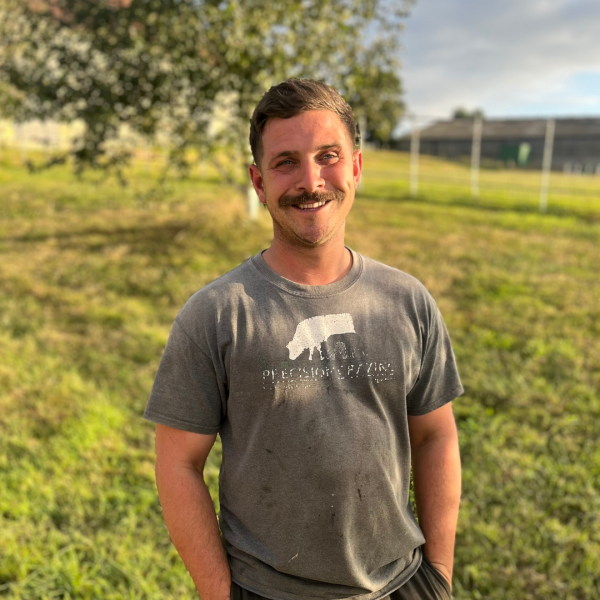
Joshua Gay
BATH
Livestock (mixed)
MIXED (LIVESTOCK & ARABLE), BATH: Joshua’s family has farmed at Newton St Loe, on the fringe of Bath, for four generations, and Joshua, the youngest of four children, was born there. Until 2000 the farm kept dairy cows, but it then switched to arable, beef and pigs. It subsequently spawned a butchery, a farm shop and a much-loved café.
The Gay family now has a large herd of pedigree south Devon cattle and a commercial herd of Angus cross (some of them daughters of the original dairy herd). The family also rears pigs in a mixed indoor and outdoor system. Having started with just traditional breeds they now cross the sows with a more commercial boar to reduce the level of back fat.
To enable the shop to offer just its own meat, Josh recently started a flock of sheep that’s grown from 120 ewes to almost 200. He hopes to increase the flock size further and to lamb at least half of them outdoors. He has 300 laying hens too.
On the arable side, Josh keeps ploughing to a minimum to reduce soil erosion, improve soil structure and biodiversity, and reduce costs. He’s also stopped using insecticides, instead relying on natural predators such as beneficial insects, and on healthy soils.
Going forward, he aims to reduce herbicides and to control weeds by other means. These include planting short-term ‘cover’ crops between main crops to smother the weeds, using animals to graze them, and deploying an “inter-row hoe” between rows. Josh is also confident that his hens are reducing the need to use wormers on his animals, as they eat the pests that attack his cattle and sheep.
“I don’t like labels, but I guess you could call my holistic grazing practices ‘regenerative’,” says Josh, who names Jake Freestone and Gabe Brown as two of his regenerative inspirations.
“I’m the youngest of four children and have always loved being outdoors, building things and creating my own little projects. When the decision finally came, I knew I wanted to be a farmer but had no real idea the amount of hard work (and time) it would take up. However, I wouldn’t have it any other way and I’m passionate about what I do.”
Josh has also gained a qualification as an electrician so he can pick up extra work if time allows or finances demand.
He says he enjoys doing something different every day and working outside with nature and the livestock. “The thing that draws me back day in and day out is the ability to set goals and achieve those goals, whether that’s regarding livestock, arable or biodiversity.”
Josh is saddened by what he perceives as a disconnect that many non-rural people have with their food and farmers and the resulting negative portrayal of farmers in the media.
Joshua is a first dan black belt in judo, plays hockey, and attends a gymnastics club. He also enjoys learning new skills and information, as well as spending time with his friends
Talking Point
Josh believes the media often twist or over-simplify the figures showing the climate change impact of beef and lamb production in the UK, and ignore the impact of other sectors. “In the UK, beef and lamb account for just 3-4% of total greenhouse gas emissions, a large proportion of those being methane emissions. But ruminants existed in large numbers across the globe long before humans started burning fossil fuels. Global warming has only been an issue since we started burning those fossil fuels, not since we started eating meat. Today, in the UK agriculture as a whole accounts for just 11% of greenhouse gas emissions, according to 2021 figures. That compares with 24% caused by transport and 21% by energy supply. I strongly and passionately believe that animal agriculture is not the cause of global warming.”
Declared interests
Member of National Farmers Union